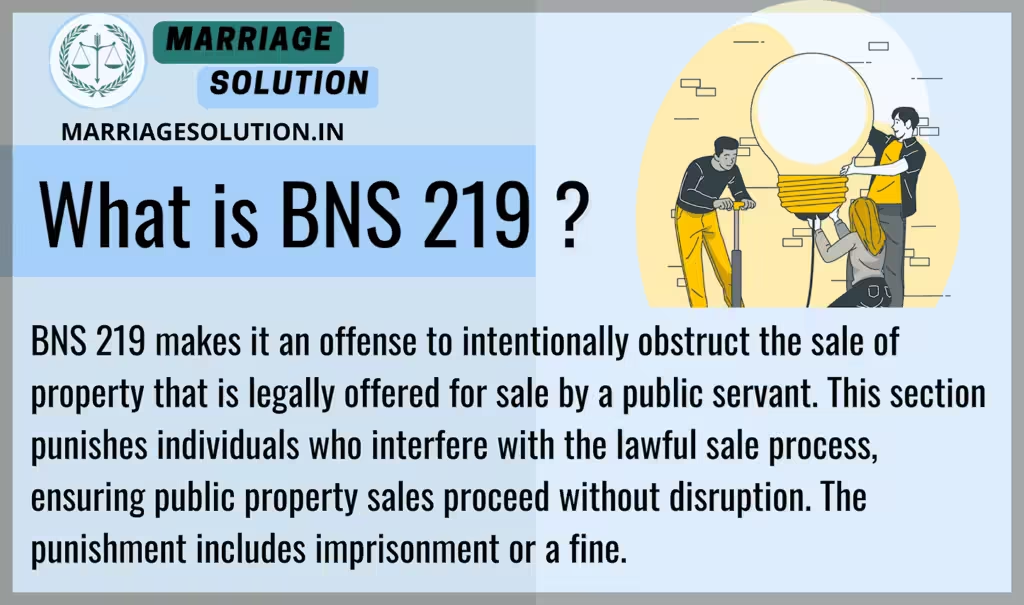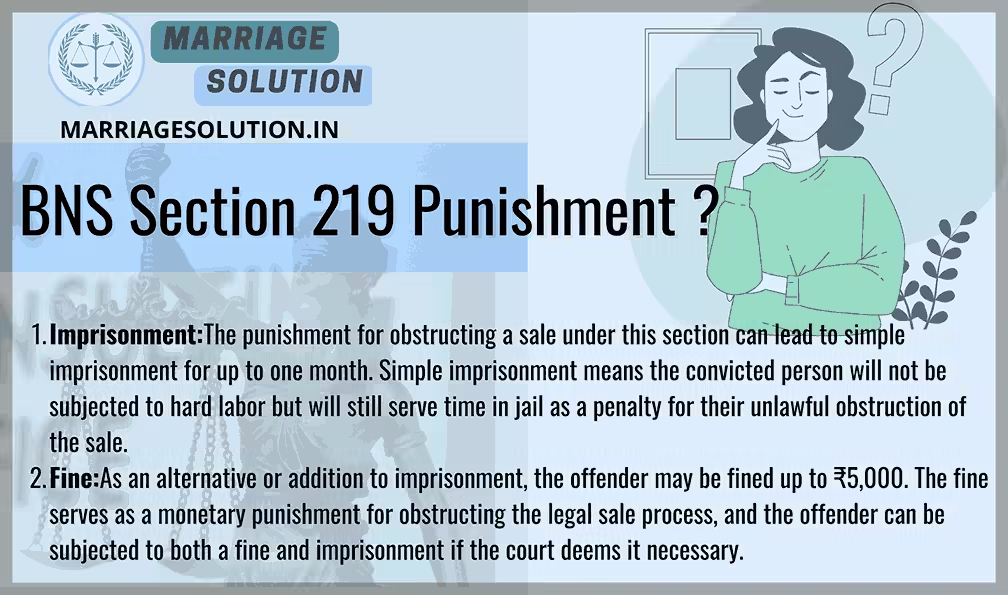Introduction of BNS 219
BNS 219 deals with the offence of obstructing the lawful sale of property conducted by a public servant. When a court officer, revenue officer, or other legally authorized authority puts property up for sale, no one is allowed to disturb or stop the process. If someone intentionally blocks such a sale, they can face legal punishment. This provision safeguards the authority of public servants and ensures that legal property auctions or sales happen smoothly without unlawful interference.
The Bharatiya Nyaya Sanhita (BNS) Section 219 replaces the old Indian Penal Code (IPC) Section 184.
What is BNS Section 219 ?
BNS Section 219 makes it an offense to intentionally obstruct the sale of property that is legally offered for sale by a public servant. This section punishes individuals who interfere with the lawful sale process, ensuring public property sales proceed without disruption. The punishment includes imprisonment or a fine.

Under Section 219 of the bns act 2023
“Whoever intentionally obstructs the sale of any property offered for sale by the lawful authority of a public servant shall be punished with imprisonment which may extend to one month, or with fine which may extend to five thousand rupees, or with both.”
1. Meaning of “Obstructing the Sale of Property”
- A public servant (like a court officer, revenue officer, or government auctioneer) may legally conduct a sale of property, such as an auction of seized goods or confiscated assets.
- If any person deliberately stops, blocks, or disturbs that sale process, they are guilty under this section.
- The obstruction must be intentional, not accidental.
2. Who is Covered?
This section applies to:
- Individuals – Any person who knowingly interferes with the authorized sale.
- Property Owners – If they resist or stop the sale of their seized property when it is legally ordered.
- Third Parties – Outsiders or supporters who disrupt the sale process on behalf of someone else.
3. Nature of the Offence
- Cognizability → Non-cognizable (police need a warrant to arrest).
- Bailability → Bailable (the accused has the right to bail).
- Compoundability → Non-compoundable (cannot be settled privately, must go through court).
- Trial → Triable by any Magistrate.
4. Examples of BNS Section 219
- Example 1: A tax officer begins auctioning land due to unpaid dues. The landowner physically stops the bidders from participating. This is obstruction under Section 219.
- Example 2: A court official is selling confiscated vehicles in a public auction. A group of people blocks the entrance to prevent the sale. They are guilty under Section 219.
- Example 3 (Not Guilty Case): If a sale is being conducted by someone without lawful authority (not a public servant), obstructing that sale does not amount to an offence under this section.
5. Punishment under BNS Section 219
- Imprisonment → Up to 1 month (simple imprisonment).
- Fine → Up to ₹5,000.
- Both → Court may impose both jail time and fine in serious cases.
6. Importance of BNS Section 219
- Protects Lawful Authority – Ensures public servants can perform their duties without disruption.
- Maintains Legal Sales – Prevents illegal interference in auctions and government sales.
- Ensures Compliance – Acts as a deterrent against those who try to misuse resistance.
- Modernized Penalty – Increases fines compared to the old IPC 184, making it a stronger safeguard.
Section 219 BNS Overview
BNS Section 219 deals with the offense of obstructing the sale of property that has been lawfully offered for sale by the authority of a public servant. If anyone intentionally disrupts or prevents such a sale, they can face legal consequences such as imprisonment, a fine, or both. This section ensures that property sales managed by public servants are not interfered with, thus protecting the lawful process.
BNS Section 219: 10 Key Points Explained in Detail
- Intentional Obstruction of a Sale:
- The section only applies when the obstruction is intentional. This means the person must knowingly disrupt the sale. Accidental interference or disruptions caused without intent are not punishable under this section. For example, if someone blocks the entryway to an auction site deliberately, it would fall under this section.
- Public Servant’s Authority:
- The sale must be conducted by a public servant with lawful authority. A public servant, such as a court officer or a government auctioneer, is someone who has the legal power to conduct the sale. Any disruption to sales not managed by public servants, such as private sales, is not covered by this section.
- Sale of Property:
- The property in question could be anything, including land, buildings, vehicles, or any movable or immovable assets. The section applies broadly to all types of property sold under a legal process initiated by a public servant.
- Lawful Offering of the Sale:
- The sale must be lawfully offered, meaning it has gone through the required legal procedures. For example, if a property is seized by the government for non-payment of taxes and is being sold by public auction, this section ensures no one can unlawfully stop the sale.
- Simple Imprisonment:
- The punishment includes simple imprisonment, which means the person convicted will not have to undergo hard labor but will still serve a sentence in jail. The imprisonment term can extend to one month, depending on the severity of the disruption.
- Fine:
- The section also allows for a fine of up to ₹5,000 for anyone convicted of obstructing the sale. The fine acts as a monetary penalty in cases where imprisonment may not be necessary.
- Combination of Imprisonment and Fine:
- In some cases, both imprisonment and a fine can be imposed. The judge has the discretion to decide based on the severity of the offense and the circumstances surrounding the obstruction.
- Non-Cognizable Offense:
- This is a non-cognizable offense, meaning that the police cannot arrest the accused without a warrant. The case needs to go through the proper legal process, and the police can only act based on a court order.
- Bailable Offense:
- Offenses under this section are bailable, which means the accused has the right to seek bail and be released from custody until the trial concludes. This indicates that the offense is not considered as grave as more serious crimes, though it is still punishable.
- Triable by Any Magistrate:
- Cases under this section can be tried by any Magistrate, making it easier to handle such cases in courts across the country. Magistrates at different levels have the authority to try these cases and hand down appropriate sentences.
BNS 219 Punishment
- Imprisonment:
- The punishment for obstructing a sale under this section can lead to simple imprisonment for up to one month. Simple imprisonment means the convicted person will not be subjected to hard labor but will still serve time in jail as a penalty for their unlawful obstruction of the sale.
- Fine:
- As an alternative or addition to imprisonment, the offender may be fined up to ₹5,000. The fine serves as a monetary punishment for obstructing the legal sale process, and the offender can be subjected to both a fine and imprisonment if the court deems it necessary.

BNS 219 bailable or not ?
BNS Section 219 is bailable. This means that the accused has the right to request bail, allowing them to stay out of custody until the case is decided in court.
Comparison Table – BNS 219 vs IPC 184
| Section | What it Means | Punishment | Bail | Cognizable? | Trial By |
|---|---|---|---|---|---|
| BNS Section 219 | Penalizes anyone who intentionally obstructs the sale of any property that is lawfully offered for sale by a public servant. Ensures smooth conduct of legal auctions and sales. | Simple imprisonment up to 1 month, or fine up to ₹5,000, or both. | Bailable | Non-Cognizable | Any Magistrate |
| IPC Section 184 (Old) | Punished obstruction of sales of property conducted under the lawful authority of a public servant. Aimed at maintaining order in official property sales. | Simple imprisonment up to 1 month, or fine up to ₹500, or both. | Bailable | Non-Cognizable | Any Magistrate |
| Key Difference: BNS 219 increases the fine limit from ₹500 (IPC 184) to ₹5,000 to provide stronger deterrence against obstructing lawful property sales. It modernizes the language while maintaining the same imprisonment term. | |||||
BNS Section 219 FAQs
What is the main offense under BNS Section 219?
The main offense is intentionally obstructing the sale of property that has been lawfully put up for sale by a public servant.
What is the punishment for obstructing such a sale?
The punishment can be up to one month of imprisonment, or a fine of ₹5,000, or both.
Is the offense under Section 219 cognizable or non-cognizable?
The offense is non-cognizable, meaning the police cannot arrest the individual without a warrant.
Is the offense bailable under BNS Section 219?
Yes, the offense is bailable, meaning the accused can request bail and avoid detention while the case proceeds.
Which court handles cases under BNS Section 219?
Cases under BNS Section 219 can be tried by any Magistrate.
What does ‘public servant’ mean in the context of this section?
A public servant is any government official who is legally authorized to oversee the sale of property, such as a court officer, revenue officer, or another government-appointed official.
Conclusion
BNS Section 219 plays an important role in protecting the lawful powers of public servants. It ensures that property sales, especially auctions of seized or confiscated assets, are conducted smoothly without unlawful interference. By updating the fines and maintaining accountability, this section strengthens the legal system and discourages individuals from disrupting official sales. In simple terms, it reminds citizens to respect legal processes and not obstruct the work of authorized officers.
Need Legal Support?
If you are dealing with court cases, marriage problems, or any other legal issue, our team at Marriage Solution – Lawyer Help is here for you. Simply fill out our quick online enquiry form, and we’ll connect you with the right legal expert to support your needs.
shed with BNS 219 ? Continue exploring the next provisions of the Bharatiya Nyaya Sanhita (BNS), 2023. Each section includes explanations, examples, and plain-language breakdowns for easy understanding.
- 220 BNS : Buying or bidding for a property in an illegal way when it is being sold under the order of a public servant.
- https://marriagesolution.in/bns_section/220-bns/
- Section 221 BNS : Stopping or disturbing a public servant while they are doing their official duty.
- https://marriagesolution.in/bns_section/section-221-bns/
- BNS 222 : Omission to assist public servant when bound by law to give assistance.
- https://marriagesolution.in/bns_section/bns-222/
- 223 BNS : Disobedience to order duly promulgated by public servant.
- https://marriagesolution.in/bns_section/223-bns/
- BNS 224 : Threat of injury to public servant.
- https://marriagesolution.in/bns_section/bns-224/
Full IPC Section List: https://marriagesolution.in/ipc-section-list
All Indian Law & Blogs: https://marriagesolution.in/indian-law/
Full BNSS Section List: https://marriagesolution.in/bnss_section-list
